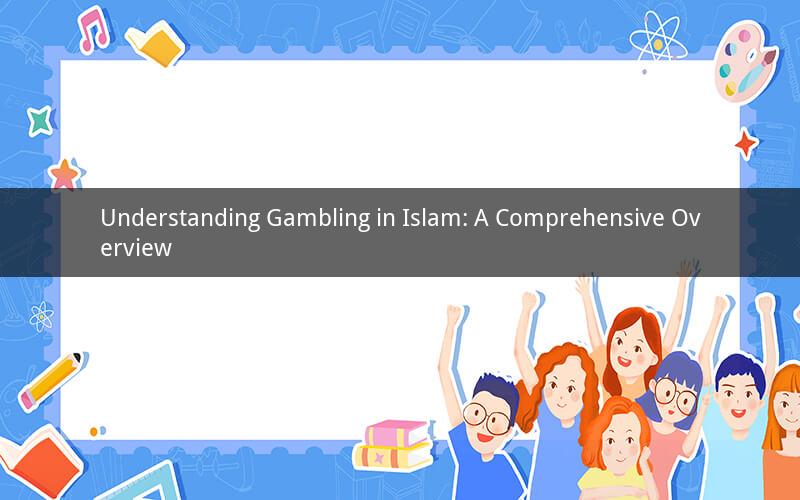
Gambling, an activity that involves betting money or valuable items on an uncertain outcome, has been a topic of much debate and controversy. In Islam, the concept of gambling is strictly prohibited, and it is considered a sin. This article aims to delve into the Islamic perspective on gambling, providing a comprehensive overview of its definition, reasons for its prohibition, and its implications.
Definition of Gambling in Islam
In Islam, gambling is defined as the act of betting on an uncertain outcome with the intention of winning money or valuable items. It is considered a form of mischief and is strictly forbidden in the Quran. The Arabic term used to describe gambling is "maysir," which encompasses any form of betting or gambling.
Reasons for Prohibition
1. Corruption of Wealth: One of the primary reasons for the prohibition of gambling in Islam is the potential for corruption of wealth. The Quran states that wealth should be used for the welfare of individuals and society, not for wasteful activities like gambling. By engaging in gambling, individuals may squander their wealth and fall into poverty.
2. Loss of Morality: Gambling is often associated with unethical behavior, such as deceit, dishonesty, and greed. It can lead individuals to prioritize material gains over moral values, causing them to lose their sense of justice and fairness. The Quran emphasizes the importance of honesty and integrity, and gambling goes against these principles.
3. Destruction of Families: Gambling can have severe consequences for families. It can lead to financial strain, domestic violence, and even divorce. The Quran encourages Muslims to maintain strong family ties and prioritize their responsibilities towards their loved ones. Gambling can disrupt these relationships and cause immense harm.
4. Social Disorder: Gambling can create social disorder and instability. It often leads to envy, jealousy, and conflict among individuals. The Quran emphasizes the importance of peace, harmony, and social cohesion, and gambling goes against these values.
Implications of Gambling in Islam
1. Legal Consequences: In many Muslim-majority countries, gambling is illegal, and individuals caught engaging in gambling activities may face legal consequences. These consequences may include fines, imprisonment, or other penalties.
2. Social Stigma: Individuals who engage in gambling may face social stigma and discrimination. They may be viewed as unreliable, dishonest, or morally corrupt. This can have a significant impact on their personal and professional lives.
3. Personal Consequences: Engaging in gambling can have severe personal consequences, including financial ruin, addiction, and mental health issues. The Quran encourages Muslims to seek moderation and avoid activities that may lead to harm.
Frequently Asked Questions
1. Is playing lottery tickets considered gambling in Islam?
Yes, playing lottery tickets is considered gambling in Islam. It involves betting on an uncertain outcome with the intention of winning money, which is strictly prohibited.
2. Can Muslims play poker with friends for fun?
No, Muslims should avoid playing poker or any form of gambling, even if it is for fun. The intention behind the activity is what matters, and the act of betting on an uncertain outcome is still considered gambling.
3. Is it permissible to bet on sports events in Islam?
Betting on sports events is considered gambling in Islam. It involves betting on an uncertain outcome, which goes against the Islamic principles of honesty and integrity.
4. Can Muslims play online casino games?
No, Muslims should avoid playing online casino games, as they involve gambling. The Quran strictly prohibits any form of betting or gambling, and engaging in such activities can lead to negative consequences.
5. Is it permissible to play card games with friends for entertainment?
Playing card games with friends for entertainment is permissible in Islam, as long as it does not involve betting or gambling. It is essential to ensure that the activity does not lead to any form of mischief or corruption.
In conclusion, gambling is strictly prohibited in Islam due to its potential to corrupt wealth, morality, and social order. Muslims are encouraged to avoid engaging in any form of gambling and to prioritize their faith, family, and moral values. By adhering to the teachings of the Quran, Muslims can lead a fulfilling and virtuous life.